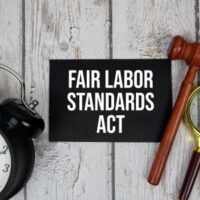Supreme Court FLSA Ruling a Win for Employers

A unanimous U.S. Supreme Court ruling is good news for employers fighting FLSA lawsuits. SCOTUS decided that employers are not required to meet a higher standard of proof to show that employees are exempt from certain pay provisions under the Fair Labor Standards Act (FLSA). According to the Supreme Court’s ruling, employers must prove that an employee is exempt from the FLSA by a preponderance of the evidence, as opposed to a higher standard of proof. The ruling overturned a Fourth Circuit decision that held that employers were required to meet a heightened standard to demonstrate that FLSA exemptions apply. The decision will realign the Fourth Circuit with other federal circuits on the issue.
Case background
The lawsuit featured a food distributor in the Washington, D.C. area that employed sales representatives who managed inventory and took orders from local grocery stores. Several of the company’s sales reps filed a lawsuit alleging that the company failed to pay them overtime in violation of the FLSA. The employer argued that the sales reps were outside salesmen, which exempted them from the FLSA’s overtime requirement.
After a bench trial, a district court sided with the sales reps. The district court found that the employer “did not prove by clear and convincing evidence that its sales representatives were outside salesmen.”
During the appeal, the employer argued that the lower court misapplied the law when it applied the “clear and convincing evidence” standard to the case. Instead, the court should have applied the “preponderance of the evidence” standard, which means it’s more likely than not. However, the Fourth Circuit refused to alter its decision. The employer filed a cert petition and asked the SCOTUS to review the case.
Why did SCOTUS side with the employer?
The Supreme Court drew attention to the fact that the preponderance-of-evidence standard is the default standard in civil litigation. The Court has only deviated from this standard on three occasions:
- When a statute specifically requires a higher standard of proof
- When the Constitution mandates a higher standard of proof, and
- In rare situations involving coercive government action.
In this case, the statute at issue is the FLSA. The FLSA does not specify a standard of proof for exemptions, and when a standard is not mentioned in the statute, “courts typically apply the preponderance standard,” the Court explained. Further, the case did not involve Constitutional rights that would require a heightened standard of proof, nor did it involve the government taking unusual or coercive action.
As a result, the Court reversed the ruling that held the heightened standard was required and remanded the case with instructions for the Fourth Circuit to determine whether the employees would fail to qualify as outside salesmen under the preponderance standard.
Talk to a Tampa, FL, FLSA Attorney Today
Florin Gray represents the interests of employees who have been shorted overtime pay by their employers or were not paid according to the minimum wage. Call our Tampa employment lawyers today to schedule an appointment, and we can begin investigating your case right away.
